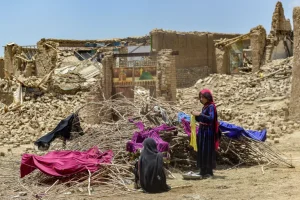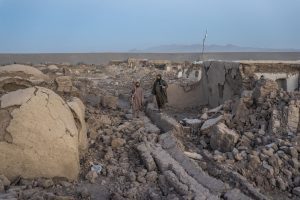Afghanistan- The Afghanistan earthquake border security situation has become increasingly critical as a 5.0 magnitude earthquake struck the war-torn nation on Friday, September 5, marking the fourth significant seismic event since Sunday. The epicentre was located approximately 110 kilometres east of Kabul, adding to the mounting challenges faced by the region’s already fragile infrastructure.
This latest tremor follows a series of aftershocks ranging from 4.5 to 5.2 magnitude that have continuously affected the area, creating additional concerns for regional stability. The Afghanistan earthquake border security implications extend beyond immediate humanitarian concerns, as the ongoing seismic activity compounds existing challenges in monitoring and securing international boundaries.
The earthquake’s epicentre was in the mountainous eastern province of Kunar, over 100 miles from populated centres, yet the tremors were felt across significant distances, including in Pakistan’s major cities. The continuous seismic activity has raised concerns about the structural integrity of border installations and monitoring systems crucial for maintaining Afghanistan’s earthquake border security protocols.
 The recent seismic events have caused substantial damage to Afghanistan’s already vulnerable infrastructure. The death toll from the larger 6.0 magnitude earthquake that preceded this event rose to at least 1,411 people, with another 3,124 injured, highlighting the region’s vulnerability to natural disasters and their cascading effects on security arrangements.
The recent seismic events have caused substantial damage to Afghanistan’s already vulnerable infrastructure. The death toll from the larger 6.0 magnitude earthquake that preceded this event rose to at least 1,411 people, with another 3,124 injured, highlighting the region’s vulnerability to natural disasters and their cascading effects on security arrangements.
Also Read: Afghanistan’s Recurring Earthquakes
Similar: Afghanistan’s Healthcare Crisis
The mountainous terrain and lack of infrastructure present primary challenges to rescue and aid efforts, with roads that were in poor condition before the earthquakes now further deteriorated. This infrastructure damage directly impacts Afghanistan’s earthquake border security by compromising access routes and communication systems essential for maintaining frontier surveillance and response capabilities.
The repeated seismic activity has created long-term concerns about the stability of border installations and monitoring equipment. Tremors were felt in Pakistani cities, including Peshawar and Islamabad, as well as parts of India, indicating the cross-border nature of these seismic impacts and their potential effect on bilateral security arrangements.
Simultaneously, the Afghanistan earthquake border security challenges are being compounded by severe flooding along the Indo-Pakistani frontier. The Ravi River’s unprecedented fury has created significant vulnerabilities in border management, washing away nearly 30 kilometres of iron fencing along the international boundary.
The flooding has caused at least 50 breaches in protective embankments across the districts of Gurdaspur, Amritsar, and Pathankot. These breaches have forced the Border Security Force (BSF) to abandon dozens of checkposts, creating gaps in surveillance and patrol coverage that could be exploited by criminal elements.
The river’s destructive path has not only damaged physical barriers but also disrupted communication networks and access roads essential for maintaining effective border management. The combination of natural disasters and infrastructure damage creates a complex scenario where Afghanistan earthquake border security concerns intersect with immediate flood-related vulnerabilities.
Criminal organisations have attempted to capitalise on the security gaps created by both the earthquake damage and river flooding. Drug traffickers from Pakistan have been using river routes and drone technology to transport larger consignments of narcotics, with the BSF intercepting over 200 rogue drones in 2024 alone.
Officials report that drug smugglers have tried to exploit the breaches in border fencing caused by the Ravi River flooding. However, the BSF’s vigilance has successfully repelled these attempts, demonstrating the critical importance of maintaining robust Afghanistan earthquake border security protocols even during natural disasters.
The international drug trade through this region involves significant financial incentives, with carriers receiving up to Rs 2 lakh for transporting heroin packets that later sell for Rs 5 crore in international markets. This economic motivation makes the security gaps created by natural disasters particularly attractive to criminal networks.
Despite the challenging circumstances created by both earthquake damage and flooding, the Border Security Force has demonstrated remarkable adaptability in maintaining Afghanistan’s earthquake border security standards. The force has repositioned personnel and resources to compensate for abandoned checkposts while working to restore damaged infrastructure.


The force has implemented emergency protocols to address the unique combination of earthquake-related infrastructure damage and flood-induced access restrictions. These measures include increased aerial surveillance, mobile patrol units, and enhanced coordination with local law enforcement agencies to maintain comprehensive border monitoring.
The intersection of natural disasters and security challenges highlighted by the Afghanistan earthquake border security situation reveals broader vulnerabilities in regional stability mechanisms. The combination of seismic activity, flooding, and criminal exploitation demonstrates how environmental factors can cascade into security concerns.
Recovery efforts must address both immediate humanitarian needs and long-term security infrastructure resilience. The damaged border installations and compromised monitoring systems require comprehensive reconstruction that incorporates lessons learned from these recent challenges.
The Afghanistan earthquake border security experience underscores the importance of disaster-resilient security infrastructure and adaptive response protocols. Future border management strategies must account for the increasing frequency and intensity of natural disasters and their potential to create security vulnerabilities.
The recent Afghanistan earthquake and order security challenges, compounded by Ravi river flooding, represent a complex intersection of natural disasters and frontier protection requirements. While immediate response efforts have successfully countered attempts at criminal exploitation, the long-term implications require comprehensive infrastructure resilience planning.
The BSF’s effective response to these dual challenges demonstrates the importance of adaptive security measures and inter-agency coordination. However, sustainable Afghanistan earthquake border security requires investment in disaster-resistant infrastructure and enhanced monitoring capabilities that can maintain effectiveness despite environmental disruptions.
As the region continues to face both seismic activity and flooding challenges, the lessons learned from this crisis will be crucial for developing more resilient border security frameworks capable of maintaining regional stability under adverse conditions.

